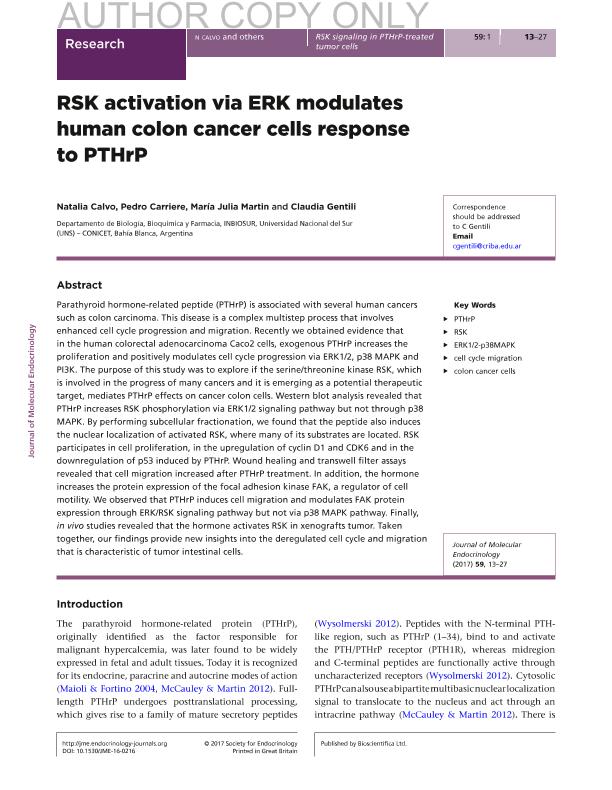Artículo
RSK activation via ERK modulates human colon cancer cells response to PTHrP
Fecha de publicación:
07/2017
Editorial:
BioScientifica
Revista:
Journal of Molecular Endocrinology
ISSN:
0952-5041
e-ISSN:
1479-6813
Idioma:
Inglés
Tipo de recurso:
Artículo publicado
Clasificación temática:
Resumen
Parathyroid hormone-related peptide (PTHrP) is associated with several human cancers such as colon carcinoma. This disease is a complex multistep process that involves enhanced cell cycle progression and migration. Recently we obtained evidence that in the human colorectal adenocarcinoma Caco2 cells, exogenous PTHrP increases the proliferation and positively modulates cell cycle progression via ERK1/2, p38 MAPK and PI3K. The purpose of this study was to explore if the serine/threonine kinase RSK, which is involved in the progress of many cancers and it is emerging as a potential therapeutic target, mediates PTHrP effects on cancer colon cells. Western blot analysis revealed that PTHrP increases RSK phosphorylation via ERK1/2 signaling pathway but not through p38 MAPK. By performing subcellular fractionation, we found that the peptide also induces the nuclear localization of activated RSK, where many of its substrates are located. RSK participates in cell proliferation, in the upregulation of cyclin D1 and CDK6 and in the downregulation of p53 induced by PTHrP. Wound healing and transwell filter assays revealed that cell migration increased after PTHrP treatment. In addition, the hormone increases the protein expression of the focal adhesion kinase FAK, a regulator of cell motility. We observed that PTHrP induces cell migration and modulates FAK protein expression through ERK/RSK signaling pathway but not via p38 MAPK pathway. Finally, in vivo studies revealed that the hormone activates RSK in xenografts tumor. Taken together, our findings provide new insights into the deregulated cell cycle and migration that is characteristic of tumor intestinal cells.
Palabras clave:
Cell Cycle Migration
,
Colon Cancer Cells
,
Erk1/2-P38mapk
,
Pthrp
,
Rsk
Archivos asociados
Licencia
Identificadores
Colecciones
Articulos(INBIOSUR)
Articulos de INSTITUTO DE CIENCIAS BIOLOGICAS Y BIOMEDICAS DEL SUR
Articulos de INSTITUTO DE CIENCIAS BIOLOGICAS Y BIOMEDICAS DEL SUR
Citación
Calvo, Natalia Graciela; Carriere, Pedro Matias; Martin, Maria Julia; Gentili, Claudia Rosana; RSK activation via ERK modulates human colon cancer cells response to PTHrP; BioScientifica; Journal of Molecular Endocrinology; 59; 1; 7-2017; 13-27
Compartir
Altmétricas




